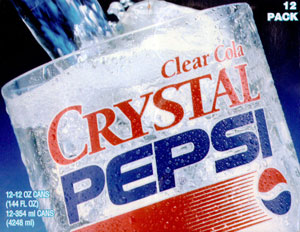The original release of Crystal Pepsi occurred in the early 1990s and, in 2016, it was rebooted for a short time and started showing up in soda coolers from grocery stores to convenience stores throughout the country, including our own Lancaster County.
When Crystal Pepsi was originally released, it quickly disappeared and was perceived as a failure. But, there’s a lot more to the story. Crystal Pepsi didn’t exactly fail on its own merit. It was targeted and then eliminated by the Coca-Cola company in what Coca-Cola Chief Marketing Officer at the time, Sergio Zyman, described as a “kamikaze” marketing strategy. In order to kill Crystal Pepsi, Coca-Cola created a terrible tasting beverage to create consumer confusion and ultimately kill both brands. It turned out to be an eye-opening example of just how brutal competition can truly be.
In the early 90s, there was a trend in marketing that basically equated “clear” with “purity” and “health”. Not surprisingly, this was in the same timespan that bottled water started rising in popularity. With more people buying bottled water, soda companies now had a new flavorless competitor and they were looking for ways to both protect their beverage market share and capitalize on the “clear” beverage craze.
Enter Crystal Pepsi.
With several marketing ploys, including TV ads using Van Halen’s popular “Right Now” song and video concept, Crystal Pepsi actually captured a whole percentage point of United States soft drink sales. At the time, these extra sales were worth about $474 million. This was good enough for the Coca-Cola company to plan a counter-attack.
Enter Sergio Zyman.
You may not recognize his name, but you will recognize his work. As Head of US Marketing for Coca-Cola, his first major move was a success – introducing Diet Coke in 1982. On the heels of this success, his next move was called “the biggest marketing blunder since the launch of Ford’s Edsel” by Fortune Magazine in 1995. That marketing blunder was New Coke. It was such a colossal failure that the original flavor was reintroduced after only 77 days as Coke Classic.
Zyman was insistent that Coca-Cola needed a bold move to reverse a slow 20-year decline in market-share against Pepsi. His insight had been seen as very valuable because he was a former marketer for Pepsi and now he needed a strategy to compete with Crystal Pepsi and redeem himself.
Enter Tab Clear.
Tab Clear was Zyman’s self-described “suicidal” and “kamikaze” marketing effort to destroy Crystal Pepsi. It was described as such because the Tab Clear brand itself was not built to succeed, on purpose. While it was marketed with an emphasis on real cola flavor, indeed “a mouthful of flavor,” in the 2011 book Killing Giants: 10 Strategies To Topple the Goliath in Your Industry an interview with Zyman was published where he revealed the truth.
Tab Clear was an intentional “born to die” plan to create an unpopular beverage and position it as a comparable beverage to capitalize on consumers’ lack of understanding of Crystal Pepsi. Remember Tab? It was the original diet cola in a pink can that was “sweetened” with saccharine and never tasted good. But, people tried to convince themselves that it did because there was no other diet cola back in the day. At this point, Tab had been rendered useless because of the success of Diet Coke, so it was considered expendable.
This was part of the “born to die” strategy. The plan to use the unpopular Tab brand, make it clear, and label it as a sugar-free diet drink. Then, when it was placed on store shelves in close proximity to Crystal Pepsi consumers would be confused into thinking Crystal Pepsi was also a sugar-free diet drink (this is where the aforementioned lack of understanding comes in).
Zyman explained it like this:
“This is like a cola, but it doesn’t have any color. It has all this great taste. And we said, ‘No, Crystal Pepsi is actually a diet drink.’ Even though it wasn’t. Because Tab had the attributes of diet, which was its demise. That was its problem. It was perceived to be a medicinal drink. Within three or five months, Tab Clear was dead. And so was Crystal Pepsi.”
The Results
So there you have it. Both brands were discontinued within six months of Tab Clear’s launch.
In a nutshell, ex-Pepsi-marketer-turned-Coca-Cola-Head-of-US-Marketing Sergio Zyman recognized that Pepsi had an idea that was proving to be successful, so he had an unpopular beverage created specifically to create brand confusion and, effectively, eliminate both brands.
What is most striking about this whole fascinating string of events is the fact that Zyman and Coca-Cola had to spend millions of dollars on ads they didn’t believe in just to eliminate a competing brand. Those ads created to sell the product resulted in millions – or at least hundreds of thousands – of consumers spending money on a product created to be unpopular. One could argue morals and ethics with that, but this kind of competitive warfare happens every day. However, just because it does happen, doesn’t mean it should.
An article from New York Daily News said Pepsi was resurrecting their “miserable failure” Crystal Pepsi for the summer. In fact, the general consensus is in agreement with this assessment. However, Crystal Pepsi was anything but a miserable failure.
Built to Fail
Would it have stood the test of time? Probably not. Once the “clear” craze passed, it would have probably gone to the soda graveyard eventually along with others like 7up Gold, New Coke, OK Soda, Pepsi Blue, and more that really were miserable failures. Crystal Pepsi, however, was initially a success in terms of market-share for a secondary brand. Don’t believe it? Then ask yourself why Coca-Cola would spend so much money and employee time to do what they did.
Speaking of 7up Gold, here is the 1988 commercial for it that served as the launching pad for the career of Kevin Gass of Tenacious D. He assumes no responsibility for the idiotic behavior of the two things to which he delivers the soda.
If these are the consequences of your soft drink, you can keep it!

